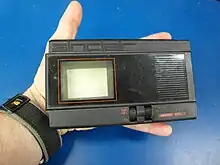
The Sinclair FTV1/TV80 flat screen TV
The Sinclair TV80, also known as the Flat Screen Pocket TV or FTV1, was a pocket television released by Sinclair Research in September 1983. Unlike Sinclair's earlier attempts at a portable television, the TV80 used a flat CRT with a side-mounted electron gun instead of a conventional CRT; the picture was made to appear larger than it was by the use of a Fresnel lens.[1] It was a commercial failure, and did not recoup the £4m it cost to develop; only 15,000 units were sold.[2] New Scientist warned that the technology used by the device would be short-lived, in view of the liquid crystal display technology being developed by Casio.[3]
 Front side of the PCB showing the flat CRT assembly
Front side of the PCB showing the flat CRT assembly Back side of the PCB showing the bottom of the CRT assembly
Back side of the PCB showing the bottom of the CRT assembly Front side of the PCB
Front side of the PCB Front side of the PCB
Front side of the PCB
References
- ↑ Polymath Perspective: Engineering for Sinclair, part 2
- ↑ "TV80 Sinclair Research, 1984". Planet Sinclair. Chris Owen. Archived from the original on 21 October 2017. Retrieved 21 October 2017.
{{cite web}}: CS1 maint: bot: original URL status unknown (link) - ↑ Aldersay-Williams, Hugh (5 May 1983). "Flat out for pocket TV". New Scientist. pp. 282–285.
External links
- Sinclair TV80 Information and Pictures at the Wayback Machine (archived November 7, 2017)
This article is issued from Wikipedia. The text is licensed under Creative Commons - Attribution - Sharealike. Additional terms may apply for the media files.